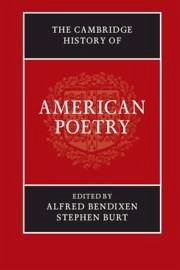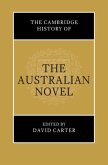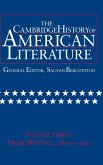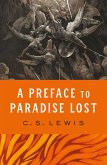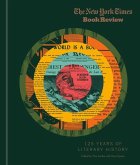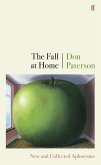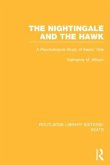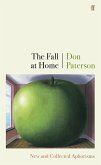The Cambridge History of American Poetry
Herausgeber: Bendixen, Alfred; Burt, Stephen
The Cambridge History of American Poetry
Herausgeber: Bendixen, Alfred; Burt, Stephen
- Broschiertes Buch
- Merkliste
- Auf die Merkliste
- Bewerten Bewerten
- Teilen
- Produkt teilen
- Produkterinnerung
- Produkterinnerung
A comprehensive exploration of the development of American poetic traditions from their beginnings until the end of the twentieth century. Bringing together the insights of fifty distinguished scholars, this literary history emphasizes the complex roles that poetry has played in American cultural and intellectual life.
Andere Kunden interessierten sich auch für
![The Cambridge History of the Australian Novel The Cambridge History of the Australian Novel]() The Cambridge History of the Australian Novel188,99 €
The Cambridge History of the Australian Novel188,99 €![The Cambridge History of American Literature The Cambridge History of American Literature]() Sacvan Bercovitch (ed.)The Cambridge History of American Literature204,99 €
Sacvan Bercovitch (ed.)The Cambridge History of American Literature204,99 €![A Preface to Paradise Lost A Preface to Paradise Lost]() C. S. LewisA Preface to Paradise Lost17,99 €
C. S. LewisA Preface to Paradise Lost17,99 €![The New York Times Book Review The New York Times Book Review]() New York TimesThe New York Times Book Review50,99 €
New York TimesThe New York Times Book Review50,99 €![The Fall at Home The Fall at Home]() Don PatersonThe Fall at Home17,99 €
Don PatersonThe Fall at Home17,99 €![The Nightingale and the Hawk The Nightingale and the Hawk]() Katharine M. WilsonThe Nightingale and the Hawk160,99 €
Katharine M. WilsonThe Nightingale and the Hawk160,99 €![The Fall at Home The Fall at Home]() Don PatersonThe Fall at Home18,99 €
Don PatersonThe Fall at Home18,99 €-
-
-
A comprehensive exploration of the development of American poetic traditions from their beginnings until the end of the twentieth century. Bringing together the insights of fifty distinguished scholars, this literary history emphasizes the complex roles that poetry has played in American cultural and intellectual life.
Hinweis: Dieser Artikel kann nur an eine deutsche Lieferadresse ausgeliefert werden.
Hinweis: Dieser Artikel kann nur an eine deutsche Lieferadresse ausgeliefert werden.
Produktdetails
- Produktdetails
- Verlag: Cambridge University Press
- Seitenzahl: 1326
- Erscheinungstermin: 15. April 2021
- Englisch
- Abmessung: 228mm x 153mm x 49mm
- Gewicht: 1636g
- ISBN-13: 9781108713214
- ISBN-10: 1108713211
- Artikelnr.: 60478407
- Herstellerkennzeichnung
- Libri GmbH
- Europaallee 1
- 36244 Bad Hersfeld
- gpsr@libri.de
- Verlag: Cambridge University Press
- Seitenzahl: 1326
- Erscheinungstermin: 15. April 2021
- Englisch
- Abmessung: 228mm x 153mm x 49mm
- Gewicht: 1636g
- ISBN-13: 9781108713214
- ISBN-10: 1108713211
- Artikelnr.: 60478407
- Herstellerkennzeichnung
- Libri GmbH
- Europaallee 1
- 36244 Bad Hersfeld
- gpsr@libri.de
Introduction Alfred Bendixen and Stephen Burt
Part I. Beginnings: Poetry before 1800: 1. Remembering Muskrat: native poetics and the American Indian oral tradition Betty Booth Donohue
2. Rhyming empires: early American poetry in languages other than English Susan Castillo Street
3. The world, the flesh, and God in puritan poetry Robert Daly
4. Confronting death: the New England puritan elegy Jeffrey A. Hammond
5. The emergence of a Southern tradition Jim Egan
6. Poetry in the time of revolution Kevin J. Hayes
Part II. A New Nation: Poetry, 1800-1900: 7. Asserting a national voice Frank Gado
8. The emergence of romantic traditions Alfred Bendixen
9. Linen shreds and melons in a field: Emerson and his contemporaries Christoph Irmscher
10. Edgar Allan Poe's lost worlds Eliza Richards
11. Longfellow in his time Virginia Jackson
12. Whittier, Holmes, Lowell and the New England tradition Michael Cohen
13. Other voices, other verses: cultures of American poetry at midcentury Mary Loeffelholz
14. American poetry fights the Civil War Faith Barrett
15. Walt Whitman's invention of a democratic poetry Ed Folsom
16. Emily Dickinson: the poetics and practice of autonomy Wendy Martin
17. The South in Reconstruction: white and black voices John D. Kerkering
18. The 'genteel tradition' and its discontents Elizabeth Renker
19. Disciplined play: American children's poetry to 1920 Angela Sorby
20. Dialect, doggerel, and local color: comic traditions and the rise of realism in popular poetry David E. E. Sloane
21. Political poets and naturalism Tyler Hoffman
Part III. Forms of Modernism, 1900-50: 22. The twentieth century begins John Timberman Newcomb
23. Robert Frost and tradition Siobhan Phillips
24. T. S. Eliot Charles Altieri
25. William Carlos Williams: the shock of the familiar Bob Perelman
26. Finding 'only words' mysterious: reading Mina Loy (and H. D.) in America Cristanne Miller
27. Marianne Moore and the printed page Robin Schulze
28. The formalist modernism of Edna St Vincent Millay, Helene Johnson, and Louise Bogan Lesley Wheeler
29. The romantic and anti-romantic in the poetry of Wallace Stevens George Lensing
30. Ezra Pound, William Carlos Williams, and the east coast projectivists Matthew Hofer
31. Langston Hughes and his world David Chioni Moore
32. The objectivists and the left Mark Scroggins
33. 'All the blessings of this consuming chance': Robert Lowell, John Berryman, Theodore Roethke, and the middle generation poets David Wojahn
34. Elizabeth Bishop, Randall Jarrell, and the lost world of real feeling Richard Flynn
35. Writing the South Ernest Suarez
Part IV. Beyond Modernism: American Poetry, 1950-2000: 36. San Francisco and the Beats Stephen Fredman
37. The New York school Brian Reed
38. The uses of authenticity: four sixties poets Nick Halpern
39. James Merrill and his circles David Bergman
40. Science in contemporary American poetry: Ammons and others Roger Gilbert
41. The 1970s and the 'poetry of the center' Edward Brunner
42. Latino poetry and poetics Rigoberto Gonzalez
43. Psychoanalytic poetics Reena Sastri
44. Asian American poetry Joseph Jonghyun Jeon
45. American poetry of the 1980s: the pressures of reality Lisa M. Steinman
46. Black and blues configurations: contemporary African American poetry Walton Muyumba
47. Amy Clampitt, 'culture' poetry, and the neo-baroque Willard Spiegelman
48. Modern and contemporary children's poetry Joseph Thomas
49. Multilingualism in contemporary American poetry Juliana Spahr
50. American poetry at the end of the millennium Stephen Burt.
Part I. Beginnings: Poetry before 1800: 1. Remembering Muskrat: native poetics and the American Indian oral tradition Betty Booth Donohue
2. Rhyming empires: early American poetry in languages other than English Susan Castillo Street
3. The world, the flesh, and God in puritan poetry Robert Daly
4. Confronting death: the New England puritan elegy Jeffrey A. Hammond
5. The emergence of a Southern tradition Jim Egan
6. Poetry in the time of revolution Kevin J. Hayes
Part II. A New Nation: Poetry, 1800-1900: 7. Asserting a national voice Frank Gado
8. The emergence of romantic traditions Alfred Bendixen
9. Linen shreds and melons in a field: Emerson and his contemporaries Christoph Irmscher
10. Edgar Allan Poe's lost worlds Eliza Richards
11. Longfellow in his time Virginia Jackson
12. Whittier, Holmes, Lowell and the New England tradition Michael Cohen
13. Other voices, other verses: cultures of American poetry at midcentury Mary Loeffelholz
14. American poetry fights the Civil War Faith Barrett
15. Walt Whitman's invention of a democratic poetry Ed Folsom
16. Emily Dickinson: the poetics and practice of autonomy Wendy Martin
17. The South in Reconstruction: white and black voices John D. Kerkering
18. The 'genteel tradition' and its discontents Elizabeth Renker
19. Disciplined play: American children's poetry to 1920 Angela Sorby
20. Dialect, doggerel, and local color: comic traditions and the rise of realism in popular poetry David E. E. Sloane
21. Political poets and naturalism Tyler Hoffman
Part III. Forms of Modernism, 1900-50: 22. The twentieth century begins John Timberman Newcomb
23. Robert Frost and tradition Siobhan Phillips
24. T. S. Eliot Charles Altieri
25. William Carlos Williams: the shock of the familiar Bob Perelman
26. Finding 'only words' mysterious: reading Mina Loy (and H. D.) in America Cristanne Miller
27. Marianne Moore and the printed page Robin Schulze
28. The formalist modernism of Edna St Vincent Millay, Helene Johnson, and Louise Bogan Lesley Wheeler
29. The romantic and anti-romantic in the poetry of Wallace Stevens George Lensing
30. Ezra Pound, William Carlos Williams, and the east coast projectivists Matthew Hofer
31. Langston Hughes and his world David Chioni Moore
32. The objectivists and the left Mark Scroggins
33. 'All the blessings of this consuming chance': Robert Lowell, John Berryman, Theodore Roethke, and the middle generation poets David Wojahn
34. Elizabeth Bishop, Randall Jarrell, and the lost world of real feeling Richard Flynn
35. Writing the South Ernest Suarez
Part IV. Beyond Modernism: American Poetry, 1950-2000: 36. San Francisco and the Beats Stephen Fredman
37. The New York school Brian Reed
38. The uses of authenticity: four sixties poets Nick Halpern
39. James Merrill and his circles David Bergman
40. Science in contemporary American poetry: Ammons and others Roger Gilbert
41. The 1970s and the 'poetry of the center' Edward Brunner
42. Latino poetry and poetics Rigoberto Gonzalez
43. Psychoanalytic poetics Reena Sastri
44. Asian American poetry Joseph Jonghyun Jeon
45. American poetry of the 1980s: the pressures of reality Lisa M. Steinman
46. Black and blues configurations: contemporary African American poetry Walton Muyumba
47. Amy Clampitt, 'culture' poetry, and the neo-baroque Willard Spiegelman
48. Modern and contemporary children's poetry Joseph Thomas
49. Multilingualism in contemporary American poetry Juliana Spahr
50. American poetry at the end of the millennium Stephen Burt.
Introduction Alfred Bendixen and Stephen Burt
Part I. Beginnings: Poetry before 1800: 1. Remembering Muskrat: native poetics and the American Indian oral tradition Betty Booth Donohue
2. Rhyming empires: early American poetry in languages other than English Susan Castillo Street
3. The world, the flesh, and God in puritan poetry Robert Daly
4. Confronting death: the New England puritan elegy Jeffrey A. Hammond
5. The emergence of a Southern tradition Jim Egan
6. Poetry in the time of revolution Kevin J. Hayes
Part II. A New Nation: Poetry, 1800-1900: 7. Asserting a national voice Frank Gado
8. The emergence of romantic traditions Alfred Bendixen
9. Linen shreds and melons in a field: Emerson and his contemporaries Christoph Irmscher
10. Edgar Allan Poe's lost worlds Eliza Richards
11. Longfellow in his time Virginia Jackson
12. Whittier, Holmes, Lowell and the New England tradition Michael Cohen
13. Other voices, other verses: cultures of American poetry at midcentury Mary Loeffelholz
14. American poetry fights the Civil War Faith Barrett
15. Walt Whitman's invention of a democratic poetry Ed Folsom
16. Emily Dickinson: the poetics and practice of autonomy Wendy Martin
17. The South in Reconstruction: white and black voices John D. Kerkering
18. The 'genteel tradition' and its discontents Elizabeth Renker
19. Disciplined play: American children's poetry to 1920 Angela Sorby
20. Dialect, doggerel, and local color: comic traditions and the rise of realism in popular poetry David E. E. Sloane
21. Political poets and naturalism Tyler Hoffman
Part III. Forms of Modernism, 1900-50: 22. The twentieth century begins John Timberman Newcomb
23. Robert Frost and tradition Siobhan Phillips
24. T. S. Eliot Charles Altieri
25. William Carlos Williams: the shock of the familiar Bob Perelman
26. Finding 'only words' mysterious: reading Mina Loy (and H. D.) in America Cristanne Miller
27. Marianne Moore and the printed page Robin Schulze
28. The formalist modernism of Edna St Vincent Millay, Helene Johnson, and Louise Bogan Lesley Wheeler
29. The romantic and anti-romantic in the poetry of Wallace Stevens George Lensing
30. Ezra Pound, William Carlos Williams, and the east coast projectivists Matthew Hofer
31. Langston Hughes and his world David Chioni Moore
32. The objectivists and the left Mark Scroggins
33. 'All the blessings of this consuming chance': Robert Lowell, John Berryman, Theodore Roethke, and the middle generation poets David Wojahn
34. Elizabeth Bishop, Randall Jarrell, and the lost world of real feeling Richard Flynn
35. Writing the South Ernest Suarez
Part IV. Beyond Modernism: American Poetry, 1950-2000: 36. San Francisco and the Beats Stephen Fredman
37. The New York school Brian Reed
38. The uses of authenticity: four sixties poets Nick Halpern
39. James Merrill and his circles David Bergman
40. Science in contemporary American poetry: Ammons and others Roger Gilbert
41. The 1970s and the 'poetry of the center' Edward Brunner
42. Latino poetry and poetics Rigoberto Gonzalez
43. Psychoanalytic poetics Reena Sastri
44. Asian American poetry Joseph Jonghyun Jeon
45. American poetry of the 1980s: the pressures of reality Lisa M. Steinman
46. Black and blues configurations: contemporary African American poetry Walton Muyumba
47. Amy Clampitt, 'culture' poetry, and the neo-baroque Willard Spiegelman
48. Modern and contemporary children's poetry Joseph Thomas
49. Multilingualism in contemporary American poetry Juliana Spahr
50. American poetry at the end of the millennium Stephen Burt.
Part I. Beginnings: Poetry before 1800: 1. Remembering Muskrat: native poetics and the American Indian oral tradition Betty Booth Donohue
2. Rhyming empires: early American poetry in languages other than English Susan Castillo Street
3. The world, the flesh, and God in puritan poetry Robert Daly
4. Confronting death: the New England puritan elegy Jeffrey A. Hammond
5. The emergence of a Southern tradition Jim Egan
6. Poetry in the time of revolution Kevin J. Hayes
Part II. A New Nation: Poetry, 1800-1900: 7. Asserting a national voice Frank Gado
8. The emergence of romantic traditions Alfred Bendixen
9. Linen shreds and melons in a field: Emerson and his contemporaries Christoph Irmscher
10. Edgar Allan Poe's lost worlds Eliza Richards
11. Longfellow in his time Virginia Jackson
12. Whittier, Holmes, Lowell and the New England tradition Michael Cohen
13. Other voices, other verses: cultures of American poetry at midcentury Mary Loeffelholz
14. American poetry fights the Civil War Faith Barrett
15. Walt Whitman's invention of a democratic poetry Ed Folsom
16. Emily Dickinson: the poetics and practice of autonomy Wendy Martin
17. The South in Reconstruction: white and black voices John D. Kerkering
18. The 'genteel tradition' and its discontents Elizabeth Renker
19. Disciplined play: American children's poetry to 1920 Angela Sorby
20. Dialect, doggerel, and local color: comic traditions and the rise of realism in popular poetry David E. E. Sloane
21. Political poets and naturalism Tyler Hoffman
Part III. Forms of Modernism, 1900-50: 22. The twentieth century begins John Timberman Newcomb
23. Robert Frost and tradition Siobhan Phillips
24. T. S. Eliot Charles Altieri
25. William Carlos Williams: the shock of the familiar Bob Perelman
26. Finding 'only words' mysterious: reading Mina Loy (and H. D.) in America Cristanne Miller
27. Marianne Moore and the printed page Robin Schulze
28. The formalist modernism of Edna St Vincent Millay, Helene Johnson, and Louise Bogan Lesley Wheeler
29. The romantic and anti-romantic in the poetry of Wallace Stevens George Lensing
30. Ezra Pound, William Carlos Williams, and the east coast projectivists Matthew Hofer
31. Langston Hughes and his world David Chioni Moore
32. The objectivists and the left Mark Scroggins
33. 'All the blessings of this consuming chance': Robert Lowell, John Berryman, Theodore Roethke, and the middle generation poets David Wojahn
34. Elizabeth Bishop, Randall Jarrell, and the lost world of real feeling Richard Flynn
35. Writing the South Ernest Suarez
Part IV. Beyond Modernism: American Poetry, 1950-2000: 36. San Francisco and the Beats Stephen Fredman
37. The New York school Brian Reed
38. The uses of authenticity: four sixties poets Nick Halpern
39. James Merrill and his circles David Bergman
40. Science in contemporary American poetry: Ammons and others Roger Gilbert
41. The 1970s and the 'poetry of the center' Edward Brunner
42. Latino poetry and poetics Rigoberto Gonzalez
43. Psychoanalytic poetics Reena Sastri
44. Asian American poetry Joseph Jonghyun Jeon
45. American poetry of the 1980s: the pressures of reality Lisa M. Steinman
46. Black and blues configurations: contemporary African American poetry Walton Muyumba
47. Amy Clampitt, 'culture' poetry, and the neo-baroque Willard Spiegelman
48. Modern and contemporary children's poetry Joseph Thomas
49. Multilingualism in contemporary American poetry Juliana Spahr
50. American poetry at the end of the millennium Stephen Burt.

